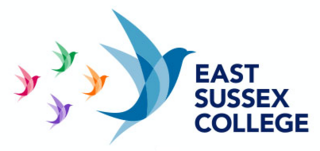The Association of College and Research Libraries defines information literacy as a "set of integrated abilities encompassing the reflective discovery of information, the understanding of how information is produced and valued and the use of information in creating new knowledge and participating ethically in communities of learning". In the United Kingdom, the Chartered Institute of Library and Information Professionals' definition also makes reference to knowing both "when" and "why" information is needed.

East Sussex College or East Sussex College Group is the largest higher education college in East Sussex, providing education and training from foundation to degree level. The college educates almost half of the county's young people and over 8,000 adults each year at campuses in Lewes, Eastbourne, Hastings and Newhaven, and in the workplace.

Jisc is a United Kingdom not-for-profit organisation that provides network and IT services and digital resources in support of further and higher education and research, as well as the public sector. Its head office is based in Bristol with offices in London, Manchester, and Oxford. Its current CEO is Heidi Fraser-Krauss, who joined in September 2021 from the University of York.

Newcastle College is a large further education and higher education college in Newcastle upon Tyne, with more than 16,000 students enrolled each year on a variety of full time, part time, and distance learning. It is the largest further education college in the North East of England and one of the largest in the United Kingdom.

Landau Forte College Derby is an academy in Derby, England. As a secondary school and sixth form, it serves students aged 11–19 from the City of Derby and surrounding areas.
In England, Wales, Northern Ireland and the Isle of Man, the Diploma in Digital Applications (DiDA) was an optional information and communication technology (ICT) course, usually studied by Key Stage 4 or equivalent school students. DiDA was introduced in 2005 as a creation of the Edexcel examination board. DiDA was notable for its time in that it consisted entirely of coursework, completed on-computer; all work relating to the DiDA course was created, stored, assessed and moderated digitally. In the late 2000s it was generally taught as a replacement for GCSE ICT, and the GNVQ which had been withdrawn in 2007. DiDA faced controversy in its lifetime, particularly after the Wolf report found that it was primarily being taught by schools because it was the equivalent of studying four GCSEs at once, which had a major impact on league table scores. From 2012 a revised DiDA and CiDA were taught by a smaller number of centres, with the original qualification removed from league table consideration in 2014. The revised version was ultimately discontinued in 2020. At the scheme's launch, 200,000 students were enrolled on the qualification; this had declined to 6,000 on the revised version in 2016 and to 1,400 students by the time of the final report in 2020.
Universities South Africa (USAf), formerly known as Higher Education South Africa (HESA), is platform that represents all 26 public universities in South Africa. USAf offers different fora for members to debate, share best practices and collaborate. USAf aims to support the South African Higher Education sector by advocating for its interests, facilitating collaboration among institutions, and promoting high-quality teaching, research, and community engagement. The USAf board is made up of 26 Vice-Chancellors drawn from member universities. USAf has positioned itself as "The Voice of South African Universities" and they endorse a comprehensive and equitable national higher education system that is responsive to the many challenges facing the country.

Wilmington Academy is a mixed secondary school located in Wilmington, Kent in the United Kingdom. It stands next to the site of Wilmington Hall.

Information and media literacy (IML) enables people to show and make informed judgments as users of information and media, as well as to become skillful creators and producers of information and media messages. IML is a combination of information literacy and media literacy. The transformative nature of IML includes creative works and creating new knowledge; to publish and collaborate responsibly requires ethical, cultural and social understanding.
Hall School Wimbledon (HSW) is a co-educational non-selective independent day school in Wimbledon, London, for children aged 5 to 16, with plans to introduce a Sixth Form in September 2023. The school was founded in 1990, by former Headmaster Timothy Hobbs, with only nine pupils. As of August 2022, the school has approximately 185+ pupils.

Franklin Sixth Form College is a sixth form college on Chelmsford Avenue in Grimsby, North East Lincolnshire, England, serving more than 2,700 students, including adult learners.
Learndirect Ltd, stylised as learndirect, is a British training provider founded in 2000, owned by the private equity firm Queens Park Equity. The company has a network of learning centres in England and Wales, and also runs some courses online.

Hull College is a Further Education and Higher Education establishment based in Kingston upon Hull, England.
E-scape was a project run by the Technology Education Research Unit (TERU) at Goldsmiths University of London, England that developed an approach to the authentic assessment of creativity and collaboration based on open-ended but structured activities. As such it is an alternative to traditional assessment methodologies.

The Constitution Society is an independent, non-party educational trust based in Westminster, London. It was established in 2009 to promote public understanding of the British Constitution and to work to encourage informed debate between legislators, academics and the public about proposals for constitutional change. The Constitution Society does not take any position on the merits of specific reform proposals but opposes ill-considered, piecemeal constitutional change. Alongside its focus on constitutional issues, The Constitution Society supports initiatives which aim to improve the quality of government and legislation generally in the UK.
The Mosslands School is a comprehensive, community school for boys aged 11–18. It is situated in Wallasey Village, Wirral, England. It is a STEAM Centre of Excellence and became a specialist Technology College in 2004.

St Columba's Catholic Boys' School is a Roman Catholic boys' secondary school with academy status, located in the Bexleyheath area of the London Borough of Bexley, England.
Queen Elizabeth School, also abbreviated to QES, is a coeducational, comprehensive secondary school and sixth form with academy status. It is located in Kirkby Lonsdale, in the English county of Cumbria. In October 2022, it had a population of 1,170 students aged 11 to 18 in KS3 and KS4, and 186 in the sixth form.

St Benedict's Catholic High School is a co-educational Roman Catholic secondary school and sixth form. It is located in Alcester in the English county of Warwickshire. The school is named after Saint Benedict of Nursia, the patron saint of Europe and students.
Empower European Universities (EEU) was a think tank based in Maastricht, the Netherlands that undertook research aiming at assessing the state of higher education policies in Europe. The organisation was launched in 2010, and terminated five years later, in 2015.










